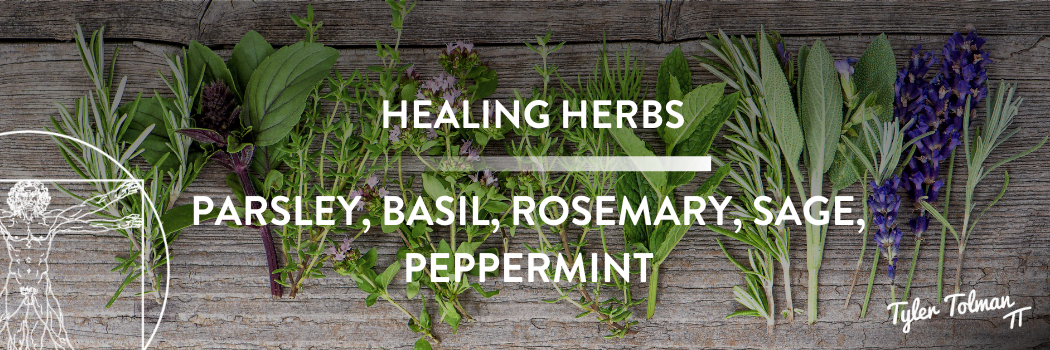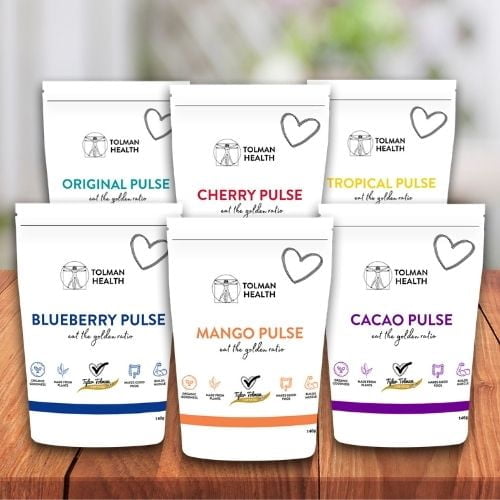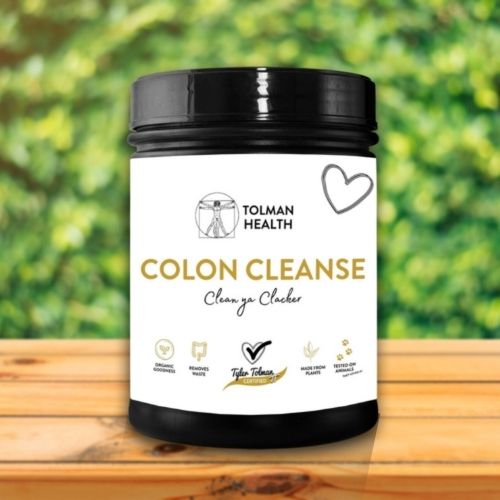TYLER TOLMAN BLOG
Healing Herbs: Parsley, Basil, Rosemary, Sage, Peppermint | Why You Should Use Them

Healing Herbs: Parsley, Basil, Rosemary, Sage, Peppermint | Why You Should Use Them
It’s no secret that cooking with herbs provides some wonderful flavours, helping meals taste extra delicious. And for some, experimenting and adding these flavourful plants is a bonus towards lowering their sodium intake.
Adding herbs, in any form, to your lifestyle also reaps many healing benefits. And one common benefit amongst many, if not all, herbs is their antioxidant capacities, which eliminates free radicals from the body and reduces oxidative stresses, which could lead to disease.
So let’s look at some benefits of a few common herbs and their contribution to a healthy you.
Parsley
While parsley contains many minerals and key nutrients, such as iron, calcium and some folate, the really big hitters are Vitamin K, A and C. In fact, parsley is so high in vitamin K that half a cup contains upwards of 500% of the daily recommendation. Vitamin K is incredibly important for bone health, increasing bone density and thereby lowering the risk of fractures.
Vitamin C, important for the immune system, flavonoids and carotenoids (beta carotene + lutein) are the main antioxidant properties found in parsley. Flavonoids are said to reduce the risk of conditions such as colon cancer, type 2 diabetes and heart disease.
Parsley is also known to be a powerful disease-fighting plant with its antibacterial and antifungal properties, making it a great natural remedy for infections.
Essential Oil Uses: arthritis pain, digestion, lowering blood pressure, relieves constipation
Basil
Basil is also a great source of lutein and beta carotene (carotenoid), which are key for protecting against disease and boosting the immune system. Other nutrients include vitamins A and K, calcium, iron and manganese.
Whilst there are a number (35) of different species of basil, the most commonly used ones are Holy Basil (Tulsi), which is used primarily for supplements and teas, and Sweet Basil is used mostly for cooking.
Basil is another herb containing a range of antioxidants to help fight disease and protect our white cells for optimal immune function. When our body is overloaded with toxins, from foods and environment pressures, oxidative stress can occur. This stress has been linked to cancer, heart disease and diabetes. Basil also helps to fight oxidation and slow down the effects of aging.
Essential Oil Uses: earaches, migraines, mental and adrenal fatigue, emotional balance
Rosemary
A very popular herb, also rich in vitamins B, iron and calcium, rosemary is equally known for its flavour as it is its medicinal uses.
While rosemary is similar to the other herbs with its antioxidant power, it presents a unique aroma. And it’s this aroma that is considered to have a ‘cognitive stimulant’ effect on the brain, thereby improving memory and concentration. The rosemary fragrance is also found to be uplifting and energising, linking it to improvements in moods and reducing stress levels due to its ability to decrease the release of the ‘stress hormone’ cortisol.
It’s also been used as a natural remedy for digestive issues, including bloating and abdominal pains, by stimulating the release of digestive fluids (bile) which helps to optimise nutrient absorption.
In addition to antioxidants, rosemary has a rich source of anti-inflammatory compounds. In some cancer studies, it has also been found to be useful as an anti-tumor agent.
Essential Oil Uses: memory, respiratory infections, nervousness, depression and multiple sclerosis.
Sage
Part of the mint family, sage has been found to improve brain function, memory recall and retention. It stops the breakdown of acetylcholine (ACH), a chemical messenger in the brain that affects memory.
It’s the ACH chemical that appears to decline in Alzheimer’s disease, thereby suggesting sage can have a positive impact on Alzheimer’s and other neurological disorders.
Sage also contains a range of anti-inflammatory and antioxidant compounds, showing impressive health benefits, such as decreasing the risk of cancer, lowering ‘bad’ cholesterol levels while maintaining ‘good’ cholesterol levels.
There is a common practice of burning sage leaves to purify the air in your home. With there being 900 species of sage, it’s important to choose the correct ones for burning (not the same as the ones used for cooking). As one of the 7 Principles of Health, air quality is very important towards good health. Because sage is considered to have antimicrobial properties, burning it helps with killing bacteria, viruses and fungi from the air.
Essential Oil Uses: reduces stress, promotes mental function, heals wounds, relieves menstrual symptoms.
Peppermint
A little different to the other herbs discussed, peppermint has been more known for its essential oil uses and herbal teas. And while peppermint doesn’t pack as many nutrients as the other herbs, you can still find some small amounts of vitamin A & C, potassium, magnesium, calcium, iron and phosphorus.
With its menthol component, peppermint has been commonly used as a holistic remedy to treat cold and flu symptoms, including decongestion. Menthol is also an expectorant, which helps to loosen up mucus and ease coughs.
It’s aroma and cooling effects help to widen air passages (bronchioles) in the lungs to increase the nasal airflow, providing more air to the lungs.
It’s the cooling sensation in the menthol that relaxes muscles, which is why it’s a common ingredient in creams and ointments targeting muscle pain.
Peppermint is also known to have antioxidants and antibacterial properties and improve digestive health.
Essential Oil Uses: alertness, fevers, hot flashes, allergies, hives, cravings and asthma.
Along with all the other leafy green whole foods, herbs boast many health benefits that can’t be ignored. Especially when they can be so easily included in your health regime, and deliciously so. Whether that be through teas, cooking or adding them fresh to your meals, juices and smoothies. And if you can’t get them fresh, stocking up on dried herbs or essential oils will also be beneficial.
Thanks for reading!





